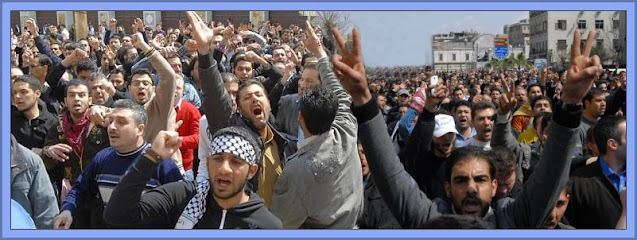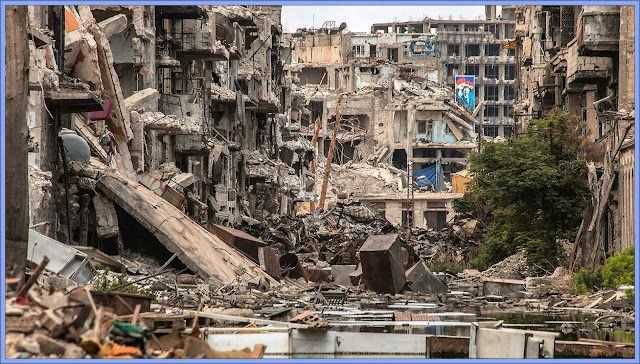 |
| Syria Divided From Start ..... |
In the Middle East, the laughably named 'Arab Spring' was not a liberalising movement, with a slight religious flavour. It did not attempt to replace the authoritarian secular dictatorships, with secular Muslim orientated democratic governments (except possibly in Tunisia). No, what happened followed the same pattern time, and time, again ...
A few students with liberal aims marched. Some repression was employed, more marched, only now there were suddenly wild eyed bearded men in the crowd. Violence beget violence, and was met by increased regime repression, and pretty soon guns and fighting commenced. However it wasn't the 'liberals' who were now in the vanguard of the rebellion, no it was the bearded radicals from the local Saudi funded mosques and Madrassas.
 |
| Protests Hijacked By Religious Fanatics ...... |
No thoughts had they of liberal or secular government. No, they dreamed of minarets and caliphates, and their eyes gleamed with the fervour of the 7th Century.
This cycle was repeated across the Muslim world. Starting in Afghanistan, where initially it was the Saudi funded Jihadists who fought the local communist government, and then US funded Jihadists, who fought the Soviet forces. This eventually led to the Taliban taking over the country, with all the terror, repression and backwardness, that eventually led to the Saudi citizen funded and planned, 9/11 attack on the USA.
Incidentally, looking back now, the Afghan communist regime, with its early egalitarian ideas of secular education for all - both boys and girls - was it seems a positive golden age for a country renowned for its social backwardness.
The West then helped this backward process further, by first cack-handedly bombing and destroying the Taliban in Afghanistan, but with no plan of how to impose democracy onto that country. Then, even more stupidly destroying the secular Baathist regime structures in Iraq - thus inviting yet another religious war between Saudi backed Sunni's, and in this case, the Iranian backed majority Shia parts, of what is essentially an artificial country. Logically the centre and south should be an Arab Shia country, and the north a Kurdish homeland, with the Northwest a Sunni area attached to Jordan or Saudi Arabia. But since when has logic prevailed in either the region, or the UN. Both of which still try to shackle the three areas together as 'one country', as though the borders have ever been more than modern man made constructs.
After all that, the region really went into the grip of the zealot madness .... Libya, Egypt, Tunisia, all experienced the same Arab spring trap .... events cycled and either they got a democracy, or they ended up with anarchy, or the regime won. Then we had Syria ... here none of the events of the other 'springs' played out completely. The bearded ones took control of the anti-regime movements and got Saudi backing (they are after all Sunni's). The regime didn't collapse (it sought aid from Shia Iran and its Russian ally), and although the chaos of Libya took a grip, it was on sectarian lines as well. Stalemate ensued until recently when Russian backing has finally tipped the balance in favour of regime survival.
 |
| Homs - Home Of The Syrian Revolution Has Paid The Price |
If you asked the citizens and exiles of Syria, if supporting the student protests those few years ago was worth it, would they truly be able to say yes? If you asked them if the idea of attaining Sunni dominance over the Alawite state, using force supported from Saudi Arabia, was worth the blood, tears, misery and displacements, would they truly be able to say yes?
If you asked the citizens of Europe, if the acts of their own governments in setting this whole instability in motion, and which has led to millions of Muslims invading the continent, was worth it, would they truly be able to say yes?








Excellent analysis.
ReplyDeleteGlad you liked the post.
DeleteThis BBC video link shows exactly the cost of 'democratic dreams'
ReplyDeleteTunisia, the birthplace of the so-called 'Arab Spring' and the one possible exception to the failure of the whole 'Arab Spring' episode (mainly due to the movements being hijacked by Islamist/jihadists groups such as Ennahda, the Islamist party in Tunisia), has now been reverting to the Arab 'strong man' politician as the secular President Kais Saied has effectively seized sole power after declaring the suspension of parliament, the sacking of the cabinet and assuming emergency powers last year.
ReplyDeleteThe poor economic and social conditions in the country, have apparently convinced many Tunisians that democracy is not delivering for them and have supported his power grab. Tunisia, unlike Egypt, still has a strong trade union movement and civil society, but no one has really opposed the new/old presidential governance to-date. But I suspect that this proves once and for all that Democracy and Islam don't work well together (or even at all).
Meanwhile autocrats in the region are hoping it will give them more ammunition to argue that "Arabs are not fit for democracy." .... a claim that it's increasingly hard to refute.